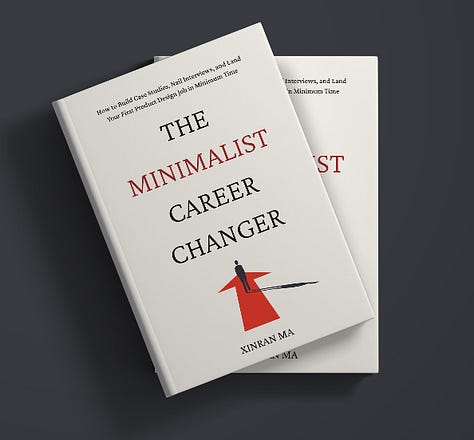Building a Substack with Notion and ChatGPT: Xinran Ma’s Writing Process
How Xinran blends AI and efficient systems to streamline his writing and content creation.
Hey, welcome to Methods—the series where we explore the creative habits of fellow Substack writers.
This week, we are featuring Xinran Ma.
Xinran is a Product Designer, Mentor, Speaker, and Author. His Substack is called Design with AI, where he explores AI's practical applications in design.
In this interview, Xinran shares:
His Notion-based content system for tracking and developing ideas.
How he balances writing with a full-time job.
And how ChatGPT helps him overcome language barriers.
Enjoy!
Know someone with a unique creative process? Drop their name in the comments—I’d love to feature them!
Notion Content Creation: A Factory for Ideas
I have a personal content-writing system—a Notion board with five columns.
The first column is called 'Raw,' so whenever I have a raw, random idea, I open a new page under that column and write it down.
The other columns are 'Ready-to-Bake,' 'Baking,' 'Ready-to-Send,' and 'Published.' It feels like a fun factory production line to me. I can make iterations and move an idea from column to column.
There are currently 300+ pages (ideas) in Notion, accumulated over the years. Most of them are just raw drafts with a few sentences, but I like documenting them. That way, if I run out of ideas, I can always go back and find one.
This system was originally inspired by Seth Godin's habit. I think I read years ago that whenever he had an idea, he’d write it on a piece of paper and put it in his drawer. I also have a habit of taking notes on my phone when I’m not at home.
I’ve been keeping a long journal documenting my kids' growth over the years, so whenever an interesting conversation happens, I try to write it down as soon as possible because it’s so easy to forget.
Writing Routine: Early Mornings, Weekend Snippets, and Daily Consistency
I don't have much time outside of my full-time job, so finding time to write has always been a challenge.
I usually wake up very early to write in the mornings and use scattered moments over the weekends. Sometimes, when I was pushing the stroller down the street, inspiration would strike, and I’d quickly jot down key sentences on my phone.
I also tend to break long articles into multiple sections—it’s just easier for me to divide and conquer. Most of my newsletters take me a total of over 3-4 hours to write, and some can take even longer, depending on how familiar I am with the topic and how much research is required.
As for consistency, I write every day and aim to publish every week.
Overcoming the Language Barrier
English is not my native language, so writing in English takes at least 10 times longer than writing in my native language, Chinese. I had to write slowly, use simple words, and reread my writings multiple times to ensure the flow was right and there were no grammar mistakes.
Since the emergence of ChatGPT, I’ve felt much more liberated. I can follow my natural flow while writing without worrying too much about grammar, then ask ChatGPT to check it at the end.
If I can’t think of the right phrase, I can ask ChatGPT for options, and when I see them, I usually can immediately find the phrase I was looking for.
Pre-Work Rituals and Habits
No warm-up :) I just wake up and start writing, with barely any transitions. I write directly on my laptop, which is more efficient for me.
That said, when I was writing my first book—The Minimalist Career Changer, I actually drafted the outline in my notebook using a pen.
Influences
I read a lot of non-fiction books and short-form writings, so I’ve been influenced by many people. It’s hard to pinpoint who has influenced me the most, as each has made an impact on different stages of my writing journey.
There’s something special about Raymond Carver’s minimalist writing that I’ve learned a lot from.
I enjoy the thought-provoking, short-form insights of Seth Godin and Derek Sivers.
Mitch Albom’s rich, narrative-driven long-form writing has deeply moved me.
I’ve also been influenced by the concise, easy-to-digest, and straight-to-the-point styles of Daniel Vassallo, Nicolas Cole, Justin Welsh, Hassan Osman, and Tim Denning.
Thanks, Xinran !
You can learn more about his courses and mentorship program over on his website:
Also check out his books - The Minimalist Career Changer Series.



Subscribe to Writers Are Weird
Access the full archiveDocumenting the creative process. Written by Sam Mas






I’d love to see a screenshot of the notion system.